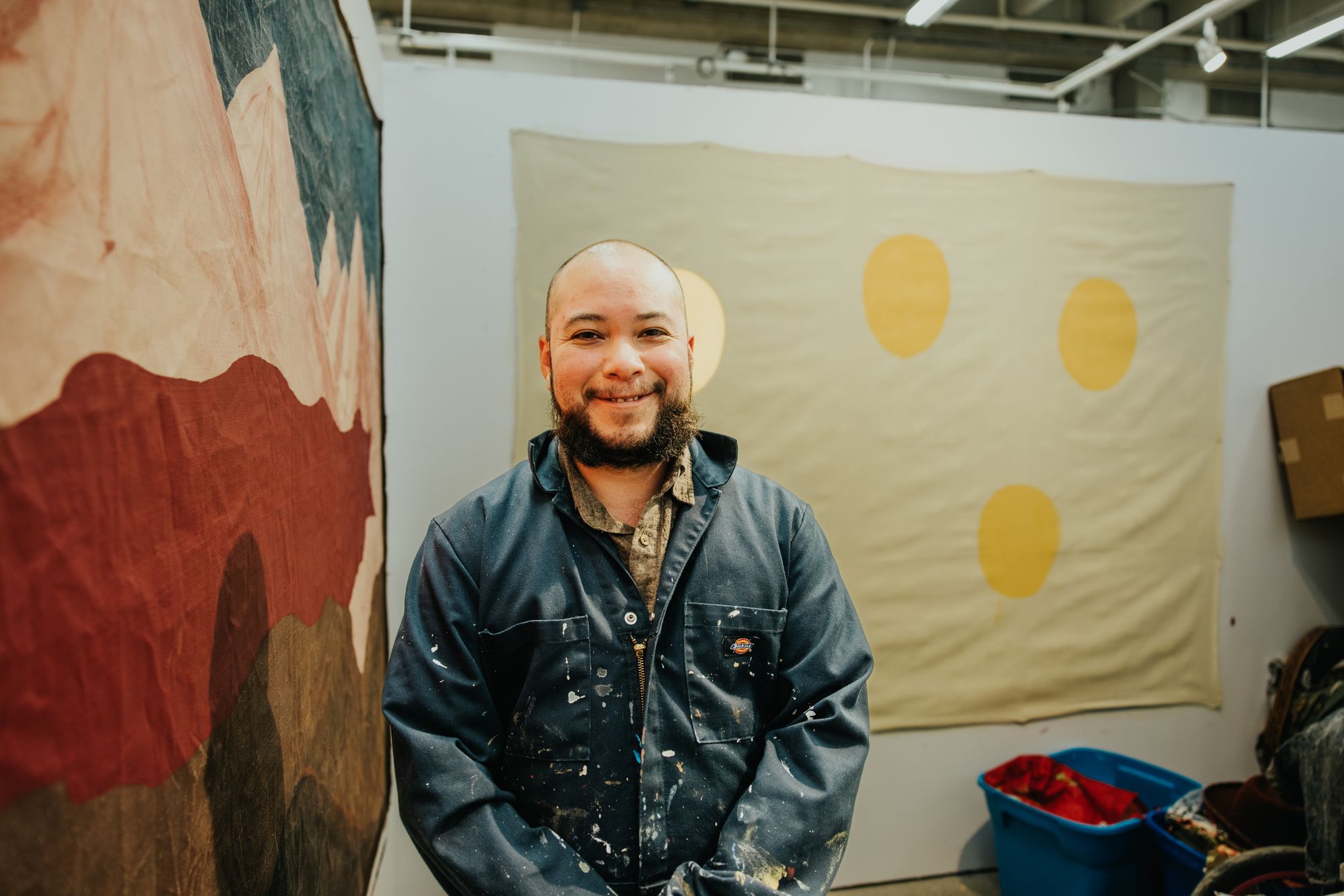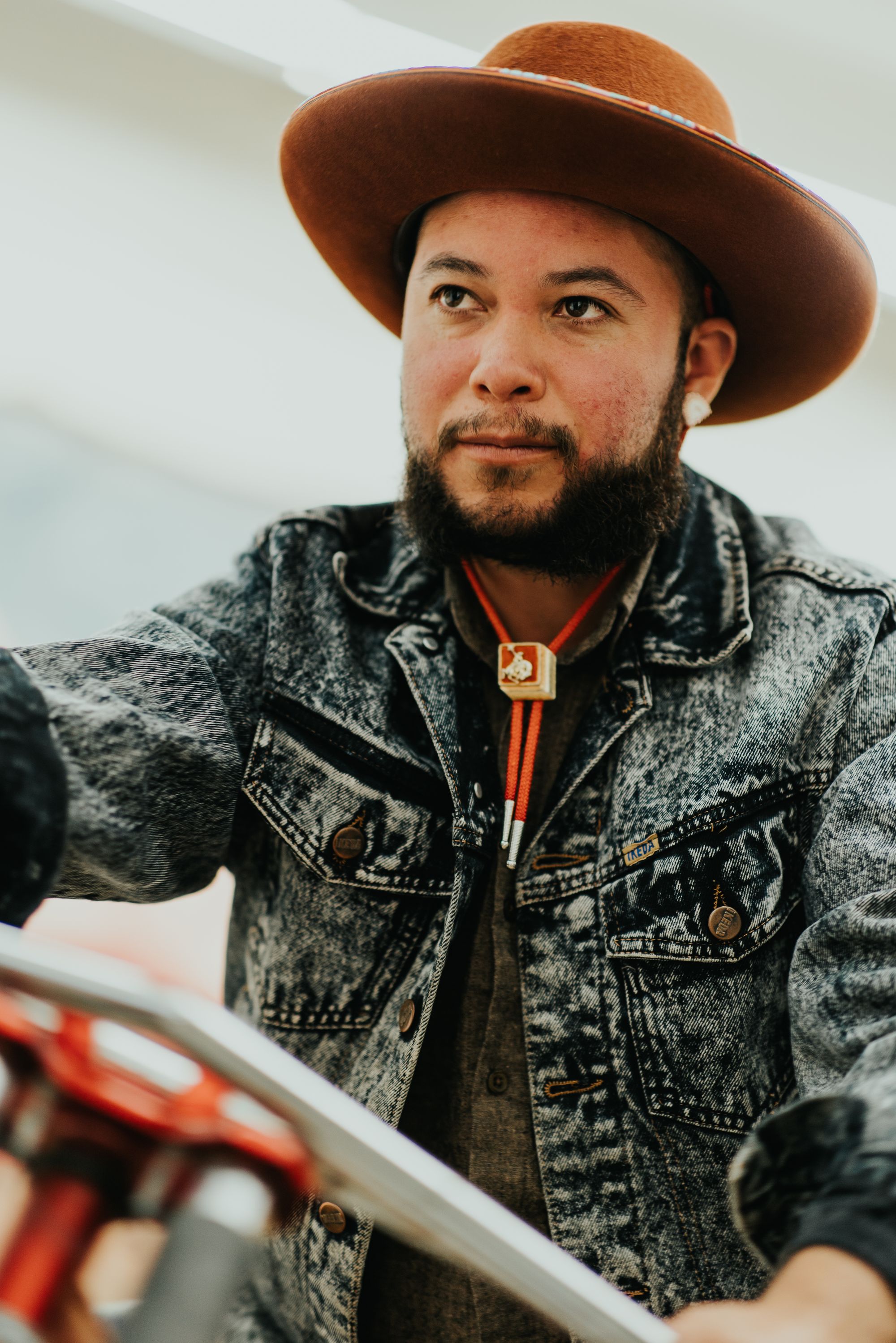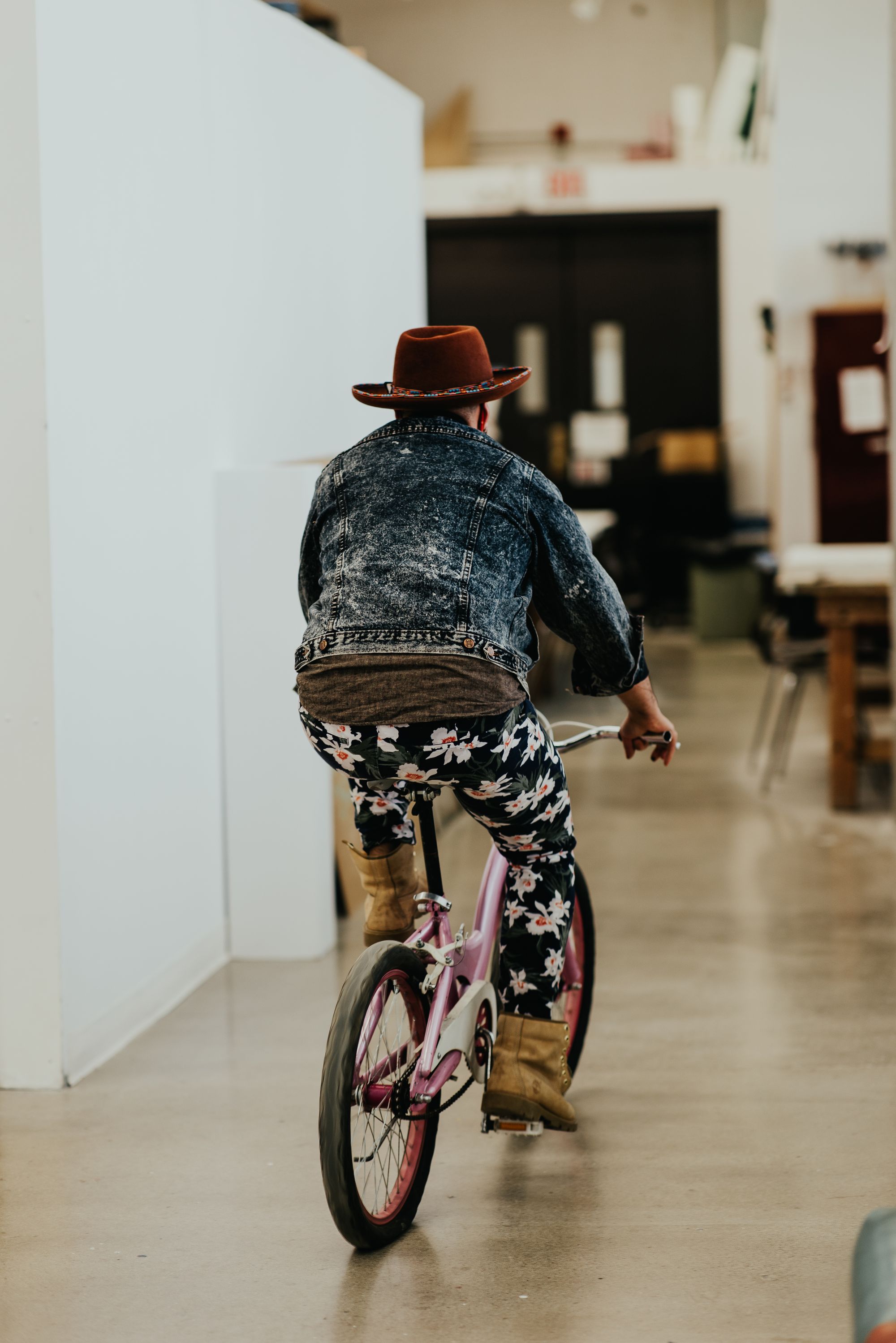Dr. Migueltzinta Solís (MFA '19, PhD '23) is an interdisciplinary artist, writer and Assistant Professor in Art at ULethbridge. Raised in California and Mexico, Migueltzinta's research and artistic practice blend video, textiles and performance art to examine notions of cultural hybridity, place, perversity and the queering and decolonizing of time.
How did you become connected with ULethbridge?
In 2017, I began my Master's in Fine Arts in Art. I had applied to three different places and ULethbridge was one of them. Honestly, this was the place that I was most excited about once I actually visited this area. I was so excited to come study here.
What happened was that I was walking down in the river valley, and the the place felt both so familiar and so unfamiliar at the same time.
I grew up in an area that has a lot of similarities in terms of the nature and also the vibe of the town. I wanted to be here. This is something that you see in my work, I would say here, just looking around, you see a lot of erased histories and untold histories coming to the surface. Things are alive. Colonial histories are very active and being openly talked about in a way, and I feel like you see that in the land here, and I wanted to participate in that story.
What does your artistic practice encompass?
My artistic practice encompasses a lot of things, many materials, many skills and many mediums. For example, the painting work I'm doing right now, I don't really think of myself as a painter. I’m really interdisciplinary in the sense that I will take on whatever material or skill or new technology I have to learn in order to make my idea or concepts come to life.

What has been one of your most significant accomplishments?
I'll tell you the story. When I finished my MFA, I didn't go to convocation. But a few months after I defended and turned in my thesis, I got my degree in the mail and I opened it just to make sure they spelled my name right, and then I put it away and forgot about it. Finishing my MFA and doing my PhD, that was a big accomplishment, but I wouldn't say it was the biggest accomplishment.
I would say the biggest accomplishment is actually all the relationships I've made here with faculty, with other students, with the community members and then just with the place itself.
A lot of my work is about relation and how do we make and keep good relationships, not just with people, but also with non-human things? Those relationships and the network of relationships that comes from working to create a web of relations. I feel really good about that accomplishment.
What are you currently working on?
My PhD thesis asks whether you be inside of something and outside of it at the same time. But what the project actually is, is what I call a postcolonial theme park. I'm designing a place that is all around us and nowhere at the same time, and it's fluid in terms of temporality, or what time it's in. The idea is that it's a conceptual theme park, so it just exists conceptually, and the part that is experienced are these bits and one-time events and performances, where you just see the trace of this imagined place.
It brings together a lot of layering of Indigenous presence and colonial presence and how it's not a binary thing. These things are very fluid and shift and mingle together, and these worldviews that we live in are always shifting.
What is one thing you want others to know about your work?
I want them to know that it's something that anyone can do. I don't mean to put down how other people approach art. I think that art is pretty open to interpretation.
When I make work, I just hope that other people also want to want to engage with it, that it gets them asking questions, that it gets them excited about picking up some kind of creative project and using it to express themselves.
I think my art really feeds me and I live for it. Especially when times are hard, I hope that people can see how I work and find something that feeds them in a similar way.
What do you hope to accomplish in the future with your artistic practice?
I think as an artist, you're supposed to want to get shows and exhibitions. It's a bit of a struggle to want to pursue that. I think I'm supposed to want to get shows and stuff, but on a deeper level, is that what I really want? I think what I want is for my work to be out there and for people to run into it, talk about it and for me to be able to have conversations with people about it.
My dream project is to have a mini-golf course that is also an art gallery, and it would be called Holes. I see it as there would be one that would be more family-friendly, and then 0ne that is maybe less family-friendly, but the idea would be that it would be a place where artists can actually contribute to the mini golf course. I like that it's both kind of a theme park and that it's just by its own nature a sort of art gallery that engages the viewer a as someone experiencing creativity versus someone that's just seeing something on a wall. This is not a new thing. In Edmonton, there was just a show that was basically a temporary mini-golf course a where artists came and built different different holes for the mini-golf course. But I want to have a permanent one. I think that would be awesome.
Where does your idea of a theme park come from?
I'm from California, which is the home of Disneyland, of course. I find Disneyland really compelling, because even though it's something that is for entertainment, we don't necessarily think about how a theme park can shape a society. But I think that theming in general, it's about creating a sense of place. The way that most theming works is that it creates a sense of place as that also constructs an idea of the other, of the exotic.
If you think about it, a lot of rides that have some kind of theme, whether that theme is about resource extraction, or Cowboys versus Indians. There is a fascination that I have with a theme park as well how this thing that we see as banal actually does affect how we think about history, or how we think about the other or the exotic.
I have other ideas around immersion, specifically immersive experience. On a more embodied level, I'm very curious about that, particularly when it comes to talking about the virtual life and things in the cybernetic realm. How do we have bodies within virtual space? Which I think is a really important question to think about, as we move between our virtual selves and our "meat" selves.
June is Pride Month—how do you celebrate Pride?
Pride, of course, is a complex thing. I'll put it this way. I lived in California's Bay Area, right by San Francisco for four years, and I didn't go to Pride a single time. Because it's very corporate, it's huge event and it just seemed like a very overwhelming thing. But here, Pride is a little different, because it's a small town and the culture is very different than San Francisco.
When you ask about how I celebrate Pride, I think, what does that mean? And how does that meaning shift from person to person?
I do think visibility is important in a place like Lethbridge. Maybe presence is a better way of thinking about it versus visibility or even "Pride". Because with presence comes power. The opposite of pride I suppose, would be a shame, right? But this dichotomy between pride and shame, it's a construct, and it's a very Christian colonial construct. I think that it's important to get past that construct and understand that you can just be.

